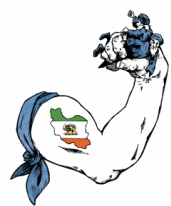Hat Tip Captain's Quarters in Mexico Wants UN To Block Fence
By JENNY BARCHFIELD, Associated Press Writer
Mexico's foreign secretary said Monday the country may take a dispute over U.S. plans to build a fence on the Mexican border to the United Nations.
Luis Ernesto Derbez told reporters in Paris, his first stop on a European tour, that a legal investigation was under way to determine whether Mexico has a case.
The Mexican government last week sent a diplomatic note to Washington criticizing the plan for 700 miles of new fencing along the border. President-elect Felipe Calderon also denounced the plan, but said it was a bilateral issue that should not be put before the international community.
Derbez said Monday after meeting with French Foreign Minister Philippe Douste-Blazy that it was a "shame" U.S. immigration policy had been used for what he claimed was a short-term political gain in the lead-up to midterm elections in the U.S. in November.
He said he discussed the issue with Douste-Blazy, and planned to bring it up in meetings with his Spanish and Italian counterparts during visits to Madrid and Rome. He vowed to work on the case until the "very last day" of President Vicente Fox's term, which ends Dec. 1.
For those who might wonder on what grounds the UN might think they have for interfering in construction inside the territory of a Sovereign Nation, I might point out the So Called UN Open Borders Initiative.
The UN's "Borderless" World
The United Nations sees the matter differently. Its bureaucrats envision a “borderless” encourage free movement of the developing countries’ poor to developed nations. This philosophy underlies their preparations for the United Nations High Level Dialogue concerning international migration and development, scheduled to take place in conjunction with the fall 2006 General Assembly session. They want the agenda for this Dialogue to center on the relationship between international migration and the economic and social development of the poorer countries in the world.
The UN bureaucrats’ aggressive push into the immigration debate fits in with their dogmatic belief that international treaties should trump national sovereignty prerogatives – in this case, a UN treaty that codifies the internationalization of immigration policy called the International Convention on the Protection of the Rights of All Migrant Workers and Members of their Families. This Convention was adopted by the General Assembly in 1990 but went into effect in 2003 after the twentieth signing country formally ratified it. It is heavily biased against countries like the United States which receive the lion’s share of illegal aliens.
Indeed, the Convention goes so far as to use the term ‘irregular’ as a euphemism for illegal aliens and would require their destination countries to provide them with an array of benefits and justiciable rights. This explains why the ratifying countries are the ones who are effectively exporting their economic problems to the United States and other destination countries, and why the destination countries in turn have not signed on.
The United Nations wants to change all that by seeking to position the right to freely migrate from poor to richer lands as a fundamental human right deserving of universal recognition. Indeed, they view internationally managed migration as an effective means to socially engineer the end of wealth disparities existing between the world’s most developed countries and the world’s developing countries. “Migration must become an integral part of global development strategies”, said a report prepared last fall by the Global Commission on International Migration set up with Kofi Annan’s assistance to help prepare the way for this fall’s United Nations High Level Dialogue. Using the euphemism ‘irregular migration’ to refer to illegal aliens, the Commission warned that restrictive national policies are “neither desirable nor feasible, and may jeopardize the rights of migrants and refugees.”
The United Nations sees the matter differently. Its bureaucrats envision a “borderless” world where immigration is treated as an international human rights issue and used as a global development tool to encourage free movement of the developing countries’ poor to developed nations. This philosophy underlies their preparations for the United Nations High Level Dialogue concerning international migration and development, scheduled to take place in conjunction with the fall 2006 General Assembly session. They want the agenda for this Dialogue to center on the relationship between international migration and the economic and social development of the poorer countries in the world.
The UN bureaucrats’ aggressive push into the immigration debate fits in with their dogmatic belief that international treaties should trump national sovereignty prerogatives – in this case, a UN treaty that codifies the internationalization of immigration policy called the International Convention on the Protection of the Rights of All Migrant Workers and Members of their Families. This Convention was adopted by the General Assembly in 1990 but went into effect in 2003 after the twentieth signing country formally ratified it. It is heavily biased against countries like the United States which receive the lion’s share of illegal aliens.
Indeed, the Convention goes so far as to use the term ‘irregular’ as a euphemism for illegal aliens and would require their destination countries to provide them with an array of benefits and justiciable rights. This explains why the ratifying countries are the ones who are effectively exporting their economic problems to the United States and other destination countries, and why the destination countries in turn have not signed on.
The United Nations wants to change all that by seeking to position the right to freely migrate from poor to richer lands as a fundamental human right deserving of universal recognition. Indeed, they view internationally managed migration as an effective means to socially engineer the end of wealth disparities existing between the world’s most developed countries and the world’s developing countries. “Migration must become an integral part of global development strategies”, said a report prepared last fall by the Global Commission on International Migration set up with Kofi Annan’s assistance to help prepare the way for this fall’s United Nations High Level Dialogue. Using the euphemism ‘irregular migration’ to refer to illegal aliens, the Commission warned that restrictive national policies are “neither desirable nor feasible, and may jeopardize the rights of migrants and refugees.”
To the UN ‘experts’ who advocate using migration as a global development tool, the unemployed poor should become the economic charges of their destination countries. For those migrants who do manage to find jobs in their destination countries, they would be expected to send money back to their families still residing in their countries of origin. These remittances, as they are called, are seen by the UN’s migration development advocates as an indirect form of aid generated from the economies of the host countries and adding significantly to the gross national product of the migrants’ countries of origin. If transfers that went through informal channels were added to the official statistics, remittances could be as high as $300 billion. They are larger than official development assistance (ODA) and more than foreign direct investment (FDI).
At the same time, these same UN ‘experts’ want to discourage the movement of those skilled educated workers from a developing country who seek better economic opportunities for themselves and their families where their skills will bring them more reward. With regard to those skilled workers who do migrate, the UN ‘experts’ expect the prosperous destination countries of these skilled workers to compensate the less developed countries of origin for the so-called “brain drain”. Of course, nothing is said about requiring compensation from the countries of origin for the educational and monetary benefits the destination countries are paying to assist their poor nationals who cross the border illegally.
In short, if the UN advocates of open borders have their way, the developing countries would get to transfer their economic underclass without any cost to the destination countries, which would be expected to subsidize them. The developing countries would also receive compensation from the destination countries where their skilled nationals have migrated in order to find gainful employment that is not available back home.
A simple translation of the above philosophy is State Sponsored Slavery, the concept that the State owns the individual and thus deserves compensation, for the denial of their services, coupled with an Internationaly enforced redistribution of wealth.
International Convention on the Protection of the Rights of All
Adopted by General Assembly resolution 45/158 of 18 December 1990
Enters into force on 1 July 2003 (Press Release)
Migration Without Borders: an Investigation into the Free Movement of People
There is a Science Fiction series in which the UN with the EU, China and Mexico, go to War with the US over a proposed UN Referendum to return the Southwest States of the US to Mexico, our Allies are Russia, because the price for China's support was Siberian Russia and Japan.
I am wondering if the premises of those works of Fiction are that farfetched.
The Heritage Trilogy by Ian Douglas
A beleaguered United States and its Russian and Japanese allies struggle to hold their own against the indomitable forces of the enemy United Nations
Technorati Tags:Mexico:UN Borderless World:Migration Without Borders
**This was a production of The Coalition Against Illegal Immigration (CAII). If you would like to participate, please go to the above link to learn more. Afterwards, email the coalition and let me know at what level you would like to participate.

Linked to
Posted by ky/kentuckydan
at 8:41 AM CDT
| Post Comment | Permalink | Share This Post
Updated: Tuesday, 10 October 2006 9:20 AM CDT
| Post Comment | Permalink | Share This Post
Updated: Tuesday, 10 October 2006 9:20 AM CDT

















